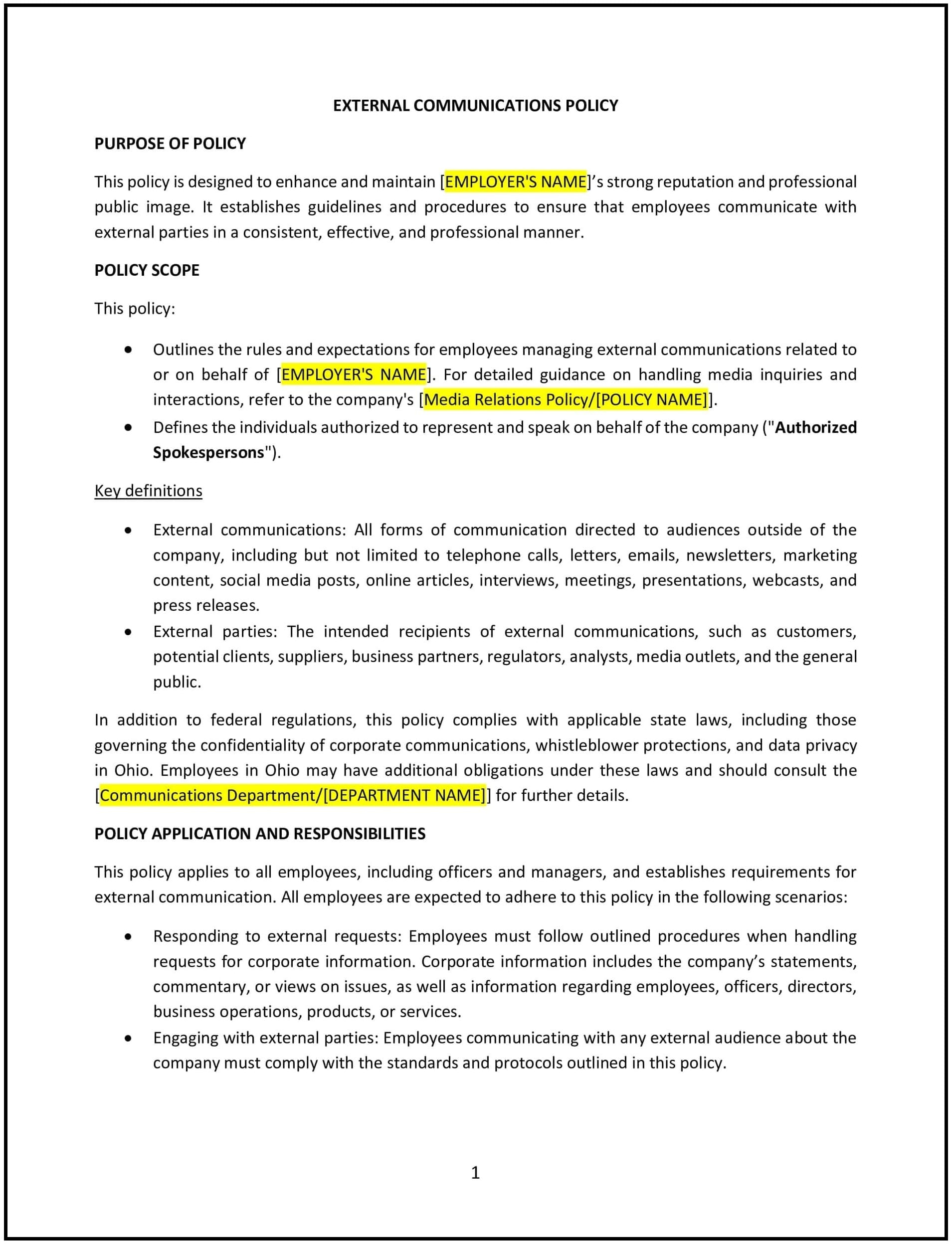External communications policy (Ohio): Free template
Got contracts to review? While you're here for policies, let Cobrief make contract review effortless—start your free review now.

Customize this template for free
External communications policy (Ohio)
An external communications policy provides Ohio businesses with clear guidelines on how employees should communicate with the public, media, and external organizations. This policy ensures that all external communications, whether in the form of press releases, social media posts, public statements, or customer interactions, align with the business's values, goals, and legal requirements. The policy outlines who is authorized to speak on behalf of the business and how to handle inquiries from external parties to protect the organization’s reputation, maintain consistency, and ensure compliance with relevant regulations.
By implementing this policy, Ohio businesses can manage their public image, reduce the risk of miscommunication, and maintain consistent messaging across all channels.
How to use this external communications policy (Ohio)
- Define authorized spokespersons: The policy should specify who within the business is authorized to communicate with external parties, such as the CEO, communications manager, or public relations team. It should clearly define the role of each spokesperson and outline the chain of communication.
- Establish guidelines for social media and digital communications: The policy should outline how employees can represent the business on social media and other digital platforms. It should clarify what is acceptable to share and what should be avoided, including sensitive information, opinions, and proprietary data.
- Set rules for press releases and public statements: The policy should specify the process for drafting and distributing press releases, public statements, or any other formal communications with external organizations. This ensures that all statements are consistent with the business’s official stance.
- Address crisis communications: The policy should provide a protocol for handling public relations crises, such as negative press or employee misconduct. It should include a plan for responding quickly and effectively, minimizing damage to the business’s reputation.
- Clarify confidentiality and proprietary information: The policy should emphasize the importance of protecting the business’s confidential information, trade secrets, and intellectual property. Employees should be reminded of their obligation not to disclose sensitive data without proper authorization.
- Provide guidelines for interacting with the media: The policy should set expectations for how employees should handle media inquiries, including the need to refer journalists to designated spokespersons. It should also clarify how to respond to inquiries about ongoing legal matters or internal issues.
- Encourage consistency in messaging: The policy should emphasize the importance of consistent messaging across all forms of external communication. It should include guidelines for ensuring that the business's values and brand voice are reflected in all public-facing communications.
- Review and update regularly: The policy should be reviewed periodically to ensure that it remains relevant and effective in light of evolving media trends, communication technologies, and Ohio state laws.
Benefits of using this external communications policy (Ohio)
This policy provides several key benefits for Ohio businesses:
- Protects the business’s reputation: By ensuring that all external communications align with the business’s values and objectives, the policy helps maintain a consistent and positive public image.
- Reduces legal and financial risks: Clear communication guidelines reduce the risk of miscommunications, legal issues, or liability arising from unauthorized disclosures of sensitive or proprietary information.
- Enhances brand consistency: A well-defined policy ensures that the business’s messaging is consistent across all channels, helping to build a stronger, more recognizable brand.
- Provides clarity and control: By designating authorized spokespersons and outlining the communication process, the policy ensures that the business retains control over how it is represented externally.
- Promotes transparency: A transparent and proactive approach to external communication fosters trust with customers, investors, and the public. It helps demonstrate the business’s commitment to openness and accountability.
- Improves crisis management: In the event of a crisis, the policy provides a framework for managing communications effectively, mitigating damage to the business’s reputation, and addressing the situation promptly.
- Encourages employee accountability: The policy sets clear expectations for employees’ roles in external communication, helping them understand the importance of maintaining professionalism and confidentiality when interacting with external parties.
Tips for using this external communications policy (Ohio)
- Communicate the policy clearly: Ensure that all employees understand the policy by including it in the employee handbook, discussing it during onboarding, and providing ongoing training on the business’s approach to external communications.
- Empower designated spokespersons: Provide designated spokespersons with the tools, training, and support they need to effectively represent the business in media interactions or public statements.
- Monitor external communications: Regularly monitor the business’s external communications to ensure they align with the policy, and address any discrepancies or concerns in a timely manner.
- Maintain a media contact list: Keep an up-to-date list of media contacts, journalists, and other relevant stakeholders, so that employees know who to contact when necessary and can direct inquiries to the appropriate individuals.
- Implement a crisis communications plan: Ensure that all employees are familiar with the procedures for handling a crisis, and regularly review and update the plan to ensure it remains effective in the event of an emergency.
- Review the policy periodically: Periodically review and update the external communications policy to keep it relevant and aligned with Ohio state laws, business practices, and technological advancements.
- Foster collaboration with marketing and legal teams: Encourage collaboration between marketing, legal, and HR departments to ensure that external communications align with business goals, legal requirements, and ethical standards.